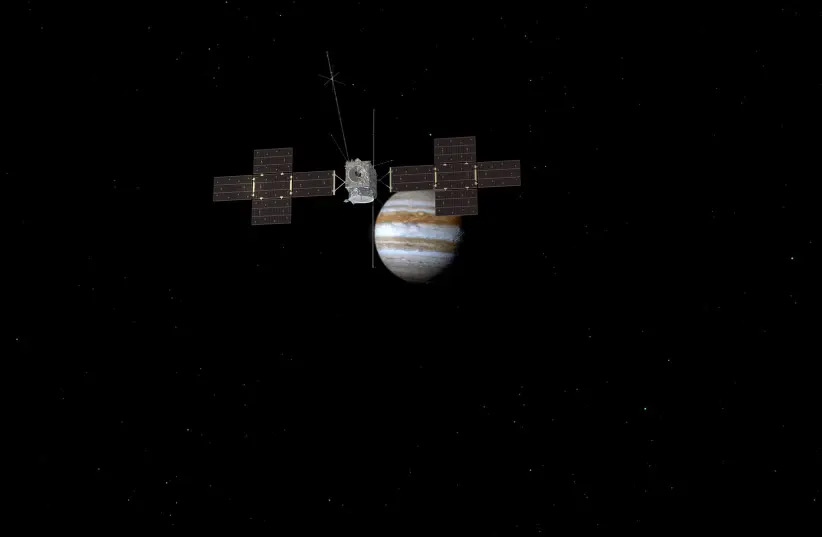
The European Space Agency's (ESA) landmark JUICE mission is set to depart for Jupiter on Thursday, April 13 – and some Israeli-made technology is on for the ride.
The Israeli participation is funded by the Israel Space Agency, which is under the auspices of the Science and Technology Ministry.
The JUICE mission, which stands for Jupiter Icy Moon Explorer, is set to embark on a 900 million-kilometer journey to the largest planet in the solar system, where it will spend four years exploring the moons of Ganymede, Callisto and Europa.
The mission is a big deal and it is the biggest the ESA has ever undertaken. And like many space missions, it's bringing along several different scientific experiments with it.
Tick tock, tick tock: Israel sends an atomic clock
One of these experiments is the USO instrument, produced by Israeli firm AccuBeat. AccuBeat is one of five companies in the world that produce atomic clocks, which are important tools used to help measure space.

Basically, they function by measuring the amount of time through the use of energy levels in atoms.
To further simplify it, it aims to make an accurate measure of time and therefore distance by linking it to a universal constant, which would be the speed of light.
Now, why do we need this at all?
Basically, if one wants to travel through space, it is important to figure out the distance from Earth in order to facilitate communications.
Communications take time, specifically, they have a set rate linked to the speed of light. The amount of time it takes for signals to go requires measurement, and that is what atomic clocks are for.
In order for the clocks to do this, they require the use of a tool known as an oscillator – you can find one in most analog clocks and wristwatches. They have quartz crystals that vibrate at a precise frequency, which is how it keeps time precise.
But when it comes to space, the window of precision is incredibly narrow. That's where AccuBeat's USO instrument comes in: It boasts what is probably the single most sensitive and accurate space oscillator.
But aside from communications work, the USO instrument is also essential for another Israeli mission on board the JUICE spacecraft.
Israeli scientists to make groundbreaking studies of Jupiter
This mission is led by Weizmann Institute of Science Prof. Yorhai Kaspi, who has made waves in the past with his research on Jupiter. Back in 2021, Kaspi was able to produce the first-ever in-depth measurement of Jupiter's famous red spot, revealing new information on the formation of storms on the planet.
Now, Kaspi, who has been pushing for this for a decade, is set to make similar breakthroughs with JUICE. For years, Kapsi and his team have helped plan JUICE's path to conduct gravitational measurements of the moons and Jupiter itself, specifically studying the winds and how they interact with gravity and the magnetic field.
"When I approached the Israel Space Agency a decade ago with the idea for an Israeli experiment on the JUICE mission, it sounded totally far-fetched," Kaspi said in a statement.
"By joining forces with AccuBeat, and with a lot of support from the Israel Space Agency, we succeeded in building the first Israeli experiment of its kind. By sending a radio beam from the spacecraft through the atmosphere, we will be able to measure minute changes in the beam's frequency thanks to the accurate clock.
"For seven years, the best Israeli minds developed and created the most stable clock in the world for deep space missions - a technological masterpiece on a global scale. AccuBeat's vast experience and knowledge helped the development of technology with unprecedented capabilities. We are proud and excited to be a part of a historic research project the results of which will lead to sensational discoveries in the world of science, space and humanity as a whole." Benny Levy
"In this way, every orbit of Jupiter will give us a temperature profile at a specific point, enabling us over the duration of the whole mission to build a three-dimensional map of Jupiter's atmosphere. The data will then enable us to understand the structure and composition of the first and biggest planet in the solar system."
AccuBeat CEO Benny Levy was also excited, saying: "For seven years, the best Israeli minds developed and created the most stable clock in the world for deep space missions – a technological masterpiece on a global scale. AccuBeat's vast experience and knowledge helped the development of technology with unprecedented capabilities. We are proud and excited to be a part of a historic research project the results of which will lead to sensational discoveries in the world of science, space and humanity as a whole."
